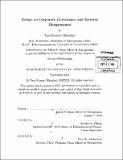| dc.contributor.advisor | Antoinette Schoar. | en_US |
| dc.contributor.author | Bhandari, Tara Kumari | en_US |
| dc.contributor.other | Sloan School of Management. | en_US |
| dc.date.accessioned | 2014-04-25T15:47:35Z | |
| dc.date.available | 2014-04-25T15:47:35Z | |
| dc.date.copyright | 2013 | en_US |
| dc.date.issued | 2013 | en_US |
| dc.identifier.uri | http://hdl.handle.net/1721.1/86264 | |
| dc.description | Thesis: Ph. D., Massachusetts Institute of Technology, Sloan School of Management, 2013. | en_US |
| dc.description | Some pages printed in landscape format. Cataloged from PDF version of thesis. | en_US |
| dc.description | Includes bibliographical references (pages 99-102). | en_US |
| dc.description.abstract | This thesis consists of two essays examining the roles of corporate governance and investor disagreement, respectively, in the performance and stock market valuations of firms. In the first chapter, I demonstrate that the relationship between corporate governance and firm performance varies with industry performance cycles. Firms with strong shareholder rights capture higher profits than poorly-governed firms in the same industry during highly profitable periods for the industry, but both groups have similar profits during weaker industry conditions. Analyst forecasts indicate that the pattern is expected, suggesting that the higher valuations of well-governed firms are due to this higher expected productivity in good times. Consistent with such expectations and with an updating of valuations as anticipated industry conditions change, positive abnormal stock returns to good governance are concentrated in periods of high industry returns, and are at least partially reversed during industry downturns. My results provide an alternative to learning and static risk theories in explaining the apparent abnormal returns to governance and their disappearance after 2001. In Chapter 2, I consider the impact of heterogeneous shareholder beliefs on stock prices, focusing on the context of corporate spin-offs and mergers. I extend theoretical work by Miller (1977) and Jarrow (1980) to show that when investors disagree about the prospects of different businesses and at least some of them are restricted from short-selling, the market price of an unseparable bundle of two enterprises will often be lower from the sum of the prices at which they would trade as standalone entities. Empirically, I construct a novel measure of observed disagreement that is informed by the theory and is less open to alternative interpretations than existing disagreement proxies. Consistent with the theory, I find that higher disagreement about the two components being either separated or joined is related to a positive return in the case of spin-offs and a negative return in stock mergers. Importantly, since I focus on returns on the ex date of these transactions, on which no new business information is released, these findings are unrelated to the expected business impact of the transactions. | en_US |
| dc.description.statementofresponsibility | by Tara Kumari Bhandari. | en_US |
| dc.format.extent | 102 pages | en_US |
| dc.language.iso | eng | en_US |
| dc.publisher | Massachusetts Institute of Technology | en_US |
| dc.rights | M.I.T. theses are protected by copyright. They may be viewed from this source for any purpose, but reproduction or distribution in any format is prohibited without written permission. See provided URL for inquiries about permission. | en_US |
| dc.rights.uri | http://dspace.mit.edu/handle/1721.1/7582 | en_US |
| dc.subject | Sloan School of Management. | en_US |
| dc.title | Essays on corporate governance and investor disagreement | en_US |
| dc.type | Thesis | en_US |
| dc.description.degree | Ph. D. | en_US |
| dc.contributor.department | Sloan School of Management | |
| dc.identifier.oclc | 874139417 | en_US |
